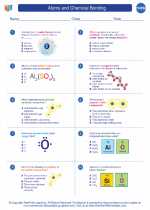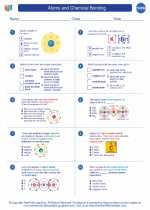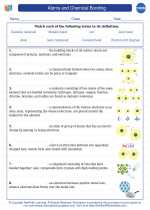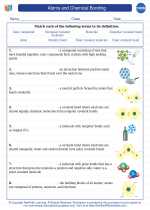High School Chemistry: Cyclones
A cyclone is a weather phenomenon characterized by strong winds and heavy rains, typically forming over warm ocean waters. In the context of chemistry, cyclones can also refer to cyclone separators, which are devices used to remove particulates from a gas, liquid, or solid stream without the use of filters. Let's dive into both aspects of cyclones.
Weather Cyclones
Weather cyclones, also known as tropical cyclones or hurricanes, are large, rotating atmospheric systems characterized by a low-pressure center, strong winds, and heavy precipitation. They typically form over warm ocean waters and can cause significant damage when they make landfall.
Here are the key points to understand about weather cyclones:
- Formation: Cyclones form over warm ocean waters when the conditions are right, including warm sea surface temperatures, high humidity, and a pre-existing weather disturbance.
- Structure: The structure of a cyclone includes an eye at the center, surrounded by an eyewall with the strongest winds, and bands of thunderstorms spiraling outward from the center.
- Impact: Cyclones can cause high winds, storm surges, and heavy rainfall, leading to widespread destruction, flooding, and loss of life.
- Naming: Cyclones are named to aid in communication and tracking. Different regions use different naming conventions for cyclones.
- Preparation and Safety: It is important for individuals and communities to be prepared for cyclones by securing properties, having emergency supplies, and following evacuation orders when necessary.
Cyclone Separators in Chemistry
In the field of chemistry, a cyclone can also refer to a cyclone separator, which is a device used to remove particulates from a gas, liquid, or solid stream without the use of filters. Cyclone separators operate on the principle of centrifugal force to separate particles from the carrying gas or liquid stream.
Here are the key points to understand about cyclone separators in chemistry:
- Principle of Operation: Cyclone separators rely on the principle of centrifugal force, where the incoming mixture is forced into a spiral flow pattern, causing the particles to be flung to the outer wall while the clean gas or liquid exits through the center.
- Applications: Cyclone separators are used in various industrial processes, including air and gas cleaning, powder handling, and solid-liquid separation.
- Efficiency: The efficiency of a cyclone separator depends on factors such as the size and density of the particles, the flow rate, and the design of the cyclone.
- Design: Cyclone separators come in various designs and sizes to accommodate different flow rates and particle sizes. The design parameters are crucial for achieving optimal performance.
- Advantages: Cyclone separators offer advantages such as low maintenance, no moving parts, and the ability to handle high-temperature and high-pressure streams.
Understanding cyclones, both in the context of weather and chemistry, is essential for various fields of study and practical applications. Whether it's tracking the path of a tropical cyclone or designing a cyclone separator for industrial processes, the principles and impacts of cyclones are significant.
.◂Chemistry Worksheets and Study Guides High School. Atoms and Chemical Bonding

 Worksheet/Answer key
Worksheet/Answer key
 Worksheet/Answer key
Worksheet/Answer key
 Vocabulary/Answer key
Vocabulary/Answer key
 Vocabulary/Answer key
Vocabulary/Answer key
